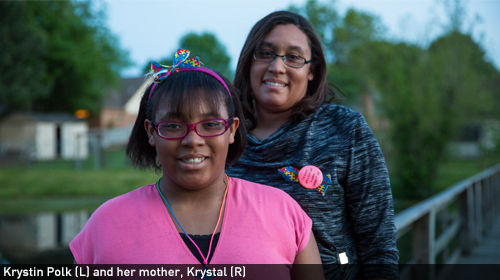How a Special Needs Kid Gets Handcuffed and Thrown in Jail "For Her Own Good"


Like nearly of children with autism spectrum disorder, Krystin Polk regularly attempts to wander from supervised, safe places such as her home or school.
The 13-year-old is enrolled at the for special education students in DeSoto County, Miss. Enrollment is contingent upon having an Individualized Educational Program (), which federal law requires for all special education students.
After Krystin ran away from the school twice in one day, Magnolia staff enlisted school resource officer (SRO) Robert "Scooter" Rayborn to help locate her. Before the day was over, Krystin would be in handcuffs.

Although her IEP painstakingly details Krystin's behavior when forcibly restrained, Rayborn seized her by the arm, causing her to lash out and knock him to the ground. The officer then tackled her and dragged her off to a county detention facility.
Krystin's mother was surprised when she heard her daughter had been arrested after running away. "Her IEP clearly states that she runs, so I didn't understand why she'd be arrested for that," says Krystal Polk. That's when the teacher explained that Krystin had assaulted a police officer.
Krystal notes that the school itself did not press the charges; she says the decision to arrest and charge her daughter was made by Rayborn (under the auspices of the DeSoto County School District), who claimed that he detained the girl "for her own good."
"When I spoke to him, he said he had been watching Krystin and thought she was behaving abnormally," Krystal explains. He arrested her so he could "get her some help."
"How could he know she needed help?" asks Krystal. "He's not a psychologist."

An hour after she spoke with Rayborn, Krystal reached the detention facility where he was taking Krystin, only to find they hadn't arrived yet. The drive shouldn't have taken more than 20 minutes.
When at last Rayborn showed up with Krystin, it was late in the day. With no one available to process and release her, she would have to spend the night in jail. In all, Krystin was detained for 24 hours.
At a court hearing several months later, the judge dismissed the charges, which by then had been changed from assault to disorderly conduct and failure to comply. "The judge said certain things were not handled correctly," says Krystal — an assessment supported by both the detention facility's intake officer and an ACLU attorney.
The incident is a microcosm of parallel issues that afflict U.S. public schools: and inadequate training for police officers charged with safeguarding students.
As reported by the ACLU in Policing In Schools:
[S]chool districts and law enforcement agencies often fail to pay sufficient attention to the ways in which policing in schools is unique; many have no formal governance document for these officers at all.
Krystal is now working with the ACLU to pass legislation requiring that Mississippi SROs be trained to deal properly with children who have autism or other special needs. She urges parents of children with autism to understand their rights and to stand firm. "Be an advocate for your child," she says, "because no one else will."

"A lot of parents don't want to speak up," Krystal adds. "They're scared of retaliation by the school district. But I know my rights, and I'm not afraid to fight for them."
Learn more about the school-to-prison pipeline and other civil liberty issues: Sign up for breaking news alerts, , and .

